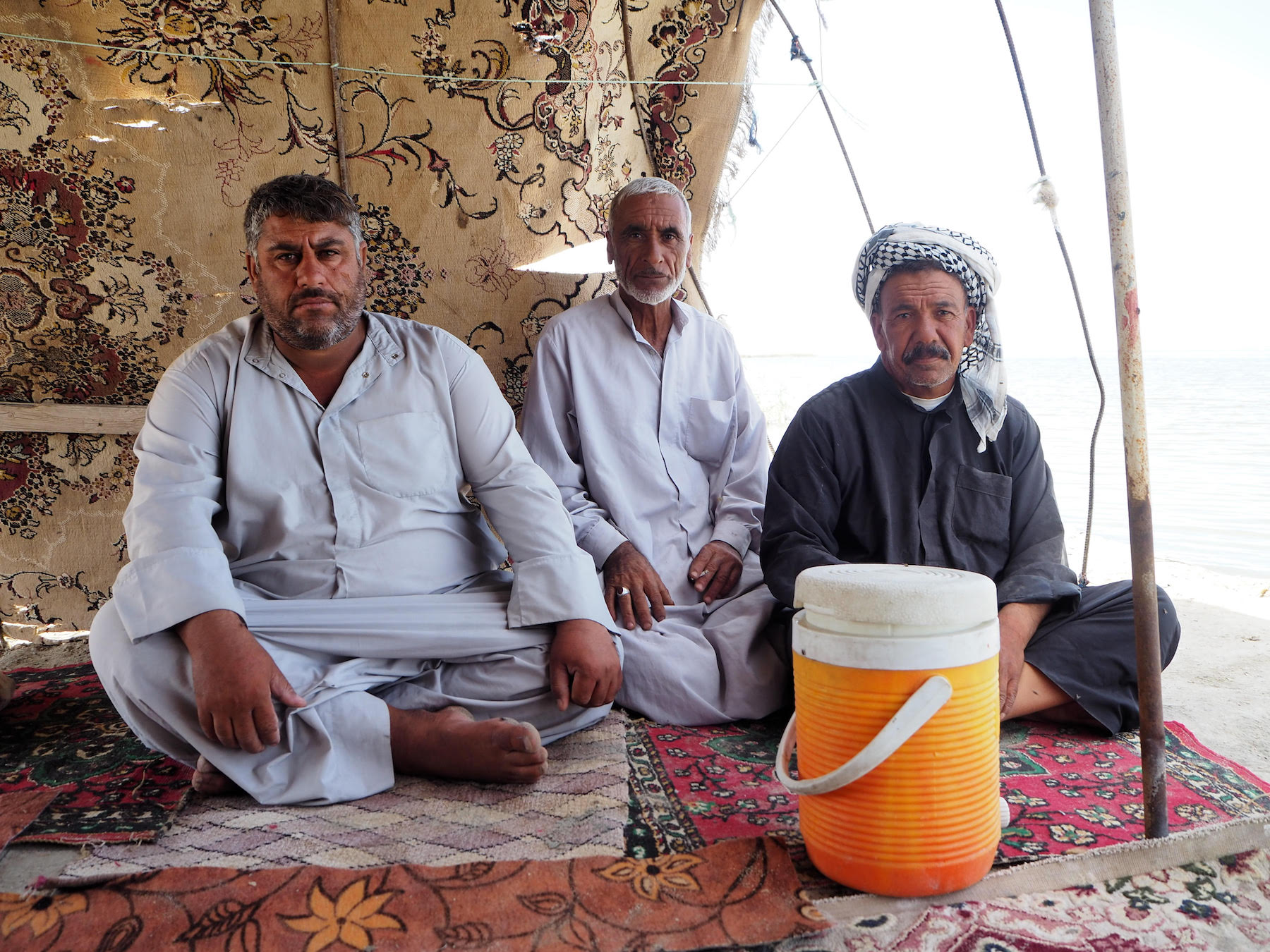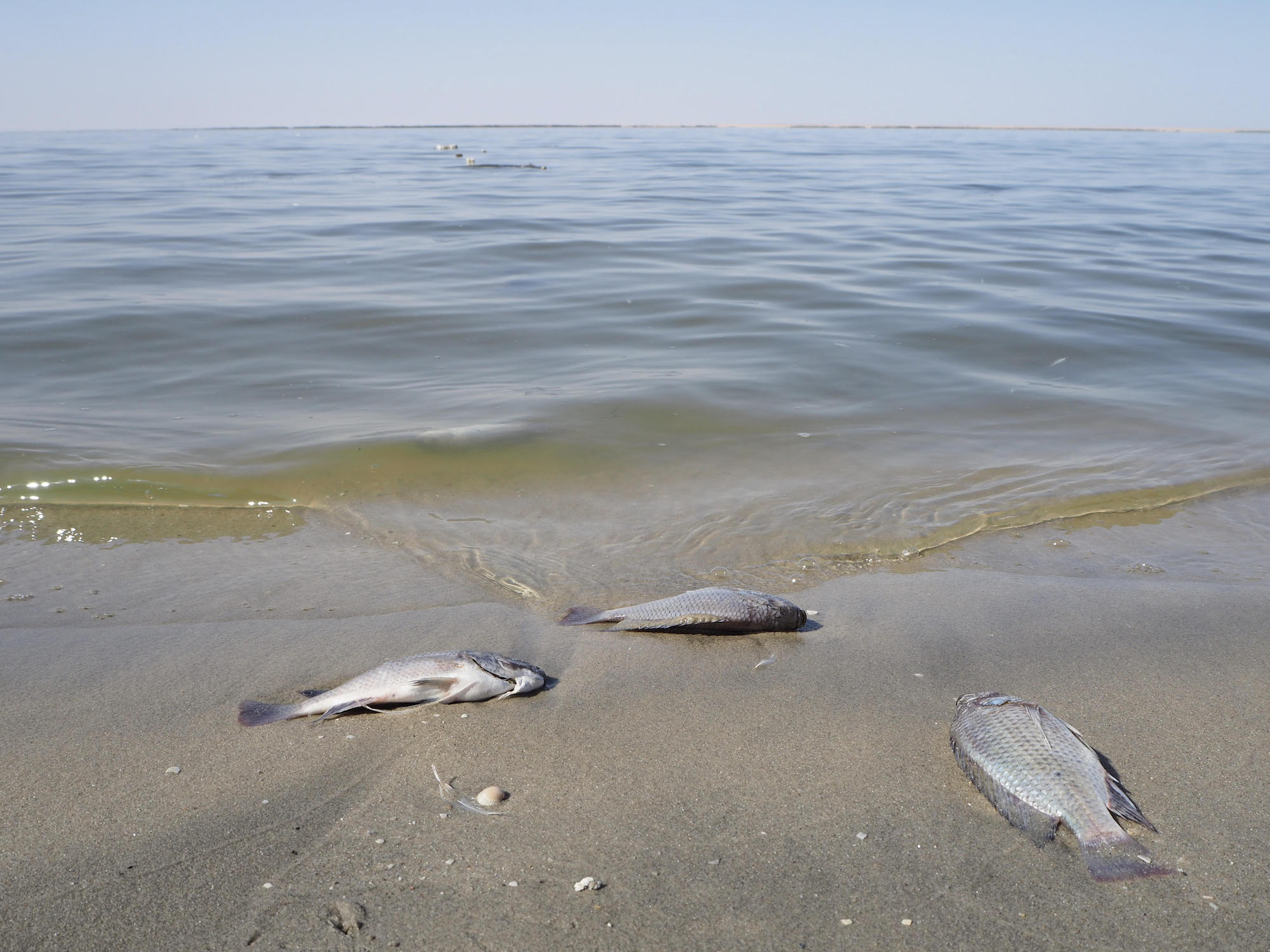A Brief Colonial History Of Ceylon(SriLanka)
Sri Lanka: One Island Two Nations
A Brief Colonial History Of Ceylon(SriLanka)
Sri Lanka: One Island Two Nations
(Full Story)
Search This Blog
Back to 500BC.
==========================
Thiranjala Weerasinghe sj.- One Island Two Nations
?????????????????????????????????????????????????Monday, January 31, 2022
Dying fish and a dying trade: Fishermen lament Iraq's shrinking Lake Razzaza
Dead fish now litter the lake's shores as drought and neighbouring countries' dam projects devastate environment

Fisherman Bashir Kamel, pictured with his morning catch, estimates that the lake has shrunk as much as 40 percent from when he first started fishing here as a boy (MEE/Tom Westcott)
By Tom Westcott-30 January 2022
Lake Razzaza, also known as Lake Milh, emerges as a pure stretch of blue beside the desert road running from the shrine city of Karbala towards Iraq’s border with Saudi Arabia, but the lapping edges of its tranquil waters now wash up dead fish.
Among the brightly-painted boats resting on the shoreline, fisherman Bashir Kamel, 38, walks barefoot carrying crates of his still-flapping morning catch. He pours the fish into a polystyrene box lined with the ice blocks that will keep them fresh until they reach a marketplace in Karbala.
“It looks like there are a lot of fish, but there are very few now because the lake is shrinking,” he tells Middle East Eye. “Every year it gets smaller.”
Kamel estimates that the lake, lying 40km west of Karbala, has shrunk as much as 40 percent from when he first started fishing here as a boy, helping his father.
“The lake used to be fed by small tributaries from the Euphrates but these tributaries were cut and since 2003 no water has come to the lake, so the water has become saltier and the freshwater fish we catch can’t survive in this salty water,” he said.
“We used to have big fish here, and they still have those in the marshes. But here, they have vanished.”
Manmade Lake Razzaza is Iraq’s second-largest freshwater lake. It was completed in the 1970s to receive excess water from Habbaniya Lake during flood season via drainage canals.
Some of these were cut as part of former Iraqi president Saddam Hussein’s efforts to quell unrest in the predominantly Shia south by draining marshlands, but decreased Euphrates floodwaters have since caused other tributaries to run dry.

Moving rhythmically between the boat and boxes, carrying the crates, Kamel steps over the dead fish that line the shoreline.
“The dead fish were not sick, they are dying because the water is becoming saltier, which is also making their colour change,” he explains.
“In the winter, the fish can adapt to salty water but in our very hot summers, evaporation makes the water saltier.
"If no freshwater comes and the lake continues to become saltier, all the fish will die.”
Further along the shoreline, four fishermen shelter from the morning sun under a makeshift tent, made from old rugs and carpet scraps.
“The number of fish that are dying are now greater than the fish we are catching,” says 40-year-old Ali, gesturing towards the shoreline.
“The water was better before and there were diverse fish, but almost all the different kinds have gone. We just depend on one type of fish now, and they are smaller and weigh much less than before.”
It is not only the fish that are dying, but also local livelihoods passed down through several generations.
There used to be around 1,000 families relying on fishing in the area, but that number has now dropped to just 50, Ali tells MEE.
“A lot of fishermen gave up the work because they couldn’t support their households on the modest income to be made from this small number of fish.
"We inherited this trade from our fathers, but if no freshwater reaches the lake, our family trade will die out.”
Dams and droughts
The fishermen believe the lake’s shrinking waters are a result of upstream dam projects, especially in neighbouring Turkey, which opened its first dam on the Euphrates in 1974.
“Turkish dams, engineered to control the water flows, are the problem,” says Ali. “In Saddam’s time, Iraq and Turkey used to have deals - Saddam would give them oil and they would give us water - but now there are no such ‘give and take’ agreements, so they don’t give us water.”
A combination of ongoing upstream dam projects and sporadic droughts that reduce annual rainfall are impacting Lake Razzaza, according to Dr Aun Abdullah, consultant and acting spokesperson for Iraq’s Ministry of Water Resources.
“For many years we have not given freshwater to this area simply because we don’t have enough,” he told MEE.
“We can only release freshwater there when the Euphrates has high floods, but we don’t know when, or if, that will happen because the Euphrates has now changed from a ‘free river’ to a ‘controlled river’ after the building of many dams and reservoirs in Turkey.”
Turkey’s ongoing Southeastern Anatolia Project (GAP), which is set to feature 22 dams and reservoirs, 14 of which will be located on the Euphrates, looms as a future threat over downstream Iraq.
“Razzaza is in a bad condition because we don’t have enough water to give," said Abdullah. "We only pump some brackish water from one drainage area to maintain it as a small lake and support the surrounding environment, but this drainage area is very poor and dry.”
Such drainage water could be why Nasa footage indicated that, in 2020, the lake had partially recovered to a similar size as recorded in 2015. However, brackish water supplies do nothing to help the fishermen because they raise saline levels, which is what is killing the fish.
Vanishing wildlife
Lake Razzaza's fisherman also believe their plight is neglected by Iraq’s political echelons who, they claim, have little interest in supporting humble trades such as those of fishermen.
“Our situation is shameful,” an ageing fisherman who declined to give his name said, adding quietly: “please write about our distress.
"Perhaps our politicians will pay attention if our situation is reported by international media.”

However, Abdullah explained that, in drought years such as 2021, the Ministry of Water Resources had to prioritise drinking water, maintaining river flows, and supporting agriculture.
With Iraq’s water supplies unable to meet current demand, and the country facing other water-related issues including poor sanitation and pollution, Lake Razzaza has been all but written off.
And with it, not only the lake’s diminished fish are under threat, but also its wider biodiversity.
Although a large community of pelicans could be seen bobbing on the lake, other birdlife is vanishing, with fisherman Aboud saying that annual flocks of migrant birds from Europe, usually seen at this time of year, were no longer in evidence.
Tourist attraction
Gloomy predictions about the lake’s complete demise have been around for years, with a 2011 report suggesting the lake could be dry within two years.
However, although it has shrunk from its previously recorded size of 1,562 square kilometres, Lake Razzaza currently endures at a considerable size and it remains a popular recreational site.
'According to our studies, unfortunately Lake Razzaza will dry out and eventually will be no more'
- Dr Aun Abdullah, consultant and acting spokesperson for Iraq’s Ministry of Water Resources
Families and visitors from nearby Karbala flock to the lake at weekends, to picnic on its shores or take leisurely boat trips out across its blue expanse.
“Karbala is basically a tourist city. Apart from during religious holidays, from most Thursday afternoons through to Saturday, many people come here,” says Aboud, who tells MEE that some of Lake Razzaza's former fisherman who abandoned their trade have now repurposed their boats for taking tourists on such trips.
Even those still fishing tap into this additional source of income at weekends, but the amount of money this generates is unreliable and insufficient for making a living.
“At the moment, we still make more money from fishing than from tourism because fishing is all week, but tourism is only at weekends,” explains Aboud.
First in line
The fishermen’s fear, if Lake Razzaza continues to shrink, is that eventually there will be neither fish nor tourism, and the lake will become just another piece of desert.
Their gloomy outlook might be partly rooted in truth. According to Abdullah, if Turkey’s upstream projects progressively reduce water flows into Syria and Iraq - not only to the Euphrates but also the Tigris - and if the region continues to be plagued by drought years, Razzaza might not be Iraq’s only lake under threat.
Under such circumstances, he said, Lake Habbaniyah (lying between Fallujah and Ramadi) and Lake Sawa (near Samawa) may also start to shrink.
Lake Razzaza, however, is first in line, and under Iraq’s current weather conditions and water shortages, Abdullah said there was little hope for the lake’s revival.
“Sometimes in the rainy season, some water comes from desert areas to the Razzaza depression but, unless the Euphrates floods, we can no longer give freshwater to the lake,” he said.
“According to our studies, unfortunately, Lake Razzaza will dry out and eventually will be no more."


